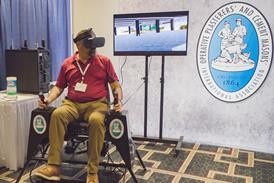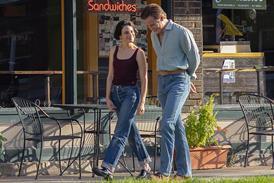Dir: Mimmo Calopresti. It. 2006. 82mins.
Mimmo Calopresti'shomage to the almost 6,000 Italian Jews who died in Hitler's death camps, and the 837 who returned alive, Volevo Solo Vivere spins amoving story out of sensitively sifted and edited archive material.
The archives used are thoseof the Shoah Foundation's Institute For Visual History And Education, which has a mandate to captureon film as many testimonies of worldwide Holocaust survivors as possible. Calopresti and his team selected nine Italian survivor storiesfrom this huge fund of material and interspersed them with historical footageand photos of the camps, the crematorium chimneys, the train convoys and theinterviewees' families in happier days.
What might have been aploddingly worthy operation is made fresh by the detail of these stories andthe chilling counterpoint of the interleaved images. The film was given a shortand ultra-limited Italian theatrical run in January - when it took around$25,000 - but this was never intended as a commercial operation. Televisionexposure looks to be its best chance of reaching the wider audience itdeserves. At Cannes it played out of competition.
The documentary begins byreminding us that, until Mussolini's 1938 Race Laws (a sop to his friendHitler), Italian Jews were seamlessly integrated into society. One intervieweerecalls that most of her classmates only realised she was Jewish on the day shewas banned from attending school. For five years the persecution was more bureaucraticthan physical; but after Mussolini's downfall in July 1943 the Germans occupiedItaly, and on 16 October 1943 the first deportations began.
On-screen captions providethe key historical information, while the interviews fill in the human elements.Nedo Fiano, who was 18 whenhe was taken to Auschwitz, remembers his last embrace with his mother, before theywere separated at the camp: she was crying so much that "it was as if she'djust come out of the shower", and his face slipped on hers when they kissed.
Other details are almostunbearably harrowing, as when Shlomo Venezia describes his job, which was to untangle the corpsesin the gas chambers and load them into the cremation furnaces. Another survivorremembers watching entire French primary school classes filing into the deathchambers, dolls and teddy bears tucked under their arms.
What comes across moststrongly is the dignity and composure of these survivors, and their compulsionto testify. They rarely break down, even when relating the worst horrors. Butwe see that Volevo Solo Vivere (translation:I Only Wanted ToLive) works to redress our modern Holocaust-insulation, our feeling that weknow all about the subject, by filling in the day-to-day facts. Archive footageprovides the visual back-up. Here, too, it's not always the most violent imagesthat are the most telling.
One of the strongestsequences consists of a series of still photos of spectacles, of hairbrushes,of shoes, removed from those who have no more need for them and sorted intoneat piles: obsessive order in the midst of unthinkable horror.
Production company
Calo
Italian distribution
01 Distribution
International sales
TBA
Executive producer
Steven Spielberg
Producers
Laurence Hoffman
Mark Edwards
Co-producers
Elda Guidinetti
Andres Pfaffli
Luisella Realini
Editors
Massimo Fiocchi
Valerio Quintarelli
Music
Federico Badaloni

















No comments yet